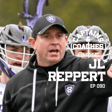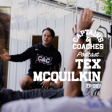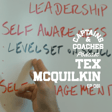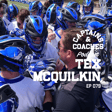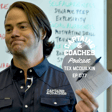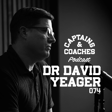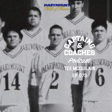Introduction to Leadership in Athletics
00:00:00
Speaker
Listen, all you can do is all you can do. And that is enough. And i heard that as a young person trying to find a way to hit a ball hard, to not get out. You know, like, ah so hard.
00:00:22
Speaker
I heard that and it felt like a relief. It's true. What else are you going to do? you going to do something you can't do? All you can do is all you can do, and that's enough.
00:00:34
Speaker
But that is not a soft comment. Because think about all you can do. You're going busy, son. but It is a ton. Let me know when you're done.
Logan Gelbrich's Leadership Journey
00:00:45
Speaker
Welcome to the Captains and Coaches podcast where we explore the art and the science of leadership through the lens of athletics and beyond. I'm your host Tex McQuilkin and today we find ourselves in Venice, California to transform how you think about leadership, process, and what it truly means to develop human potential.
00:01:03
Speaker
My guest is Logan Gelberg, founder of Deuce Gym and host of the Hold the Standard podcast. Logan's journey from collegiate baseball captain at the University of San Diego to coaching coaches has given him unique insights into how authentic leadership emerges from the ground up, not the top down.
00:01:21
Speaker
We're exploring the revolutionary idea that true leadership isn't about authority or titles. It's about creating environments where people can take ownership of their growth, where process becomes more important than outcome, and where the pursuit of excellence transforms from individual achievement into a shared responsibility.
Creating Growth Environments
00:01:41
Speaker
Logan will break down how the lessons learned between the lines translates directly into building thriving businesses and communities. This isn't just about sports. It's about unlocking human potential through intentional, purposeful development.
00:01:56
Speaker
Now, let's take a swing with Logan, who helps us raise the game. Ready, ready, and ready.
00:02:07
Speaker
Deuce Jim in the back room where Strike Movement Shoes is? Strike Store. Strike Store, okay. It's only Strike Store in the in the world at the moment.
00:02:18
Speaker
We're in it. We are in it. All right. SoCal, baby, the weather couldn't get much better today. I mean, 80-ish? We pay for it, you know? It's expensive to be this sunny with a breeze.
00:02:32
Speaker
There we go. Logan, it's been a while. We just recorded podcast. It's been like minutes. I know. Since we've done this. But before we did your podcast, yeah which where can people find that?
00:02:46
Speaker
ah Yeah, holdstandard.com. ah You can also find it at deucegym.com. And anywhere podcasts are distributed, i guess. It's called the Hold the Standard Podcast.
00:02:59
Speaker
Nice. Well, I want to dive into into that standard.
Influence of Early Leadership Experiences
00:03:03
Speaker
So you had an expectation when you were a collegiate baseball player at the San Diego... University of San Diego. University of San Diego.
00:03:11
Speaker
And... You met Dr. Kara Miller, who's just inspirational force ah behind leadership in the the business business realm. And you had the opportunity to captain and lead your baseball team and then step into the professional ranks.
00:03:26
Speaker
So, so much growth, leadership, and now here you are, coaching coaches, leading a successful business on this beautiful street. What do we... with Lincoln Boulevard. Lincoln Boulevard. It's one of the busier... no one that drives on Lincoln likes Lincoln.
00:03:43
Speaker
You know, it's a ah it's a busy the traffic, you know, but it's a good street. You're not wrong. I was just catty-quartered across there next to the other auto repair shop in one of those vehicles with no driver. It's a oh Waymo. A Waymo.
00:03:58
Speaker
And how'd you go? You're right. Well, I made it. Yeah. ah Yeah, it was basically Frogger like we're going forward going backwards. I mean, this is just a busy street. There's no light.
00:04:10
Speaker
Oh, they're trying to cross the street. I wouldn't recommend that with or without a driver. That's a bad. Well, logic and machines. Have you seen the movie The Sixth the Day starring Arnold Schwarzenegger? No, I've seen so few movies, but I can quote the ones that I've seen. Okay, well, this podcast is over, and that's our show. See ya.
00:04:29
Speaker
ah but Needless to say, dude, I want to just step into that entry level leadership. You took on the responsibilities as captain of your team and you continue to apply those lessons and lead individuals, build up, grow individuals and prepare them for their next phases, whether it's ah paying members of the gym or coaches going through your education and development.
Setting Standards for Excellence
00:04:52
Speaker
Yeah. Yeah. I mean, i keep coming back to this moment in college.
00:05:01
Speaker
I've talked about this before, so, ah you know, sorry for being repetitive, but first team meeting freshman year, it was almost like a dual out-of-body experience. So I'm sitting in the front row, young guy trying to make a ah team, trying to make a, you know, earn a job. but And so I'm listening from the perspective of player, but then I somehow, when Coach Hill walked in, i was like, oh, this guy is about to come in here and his livelihood depends on if he can get these idiots, myself included, to figure out how to win baseball games.
00:05:47
Speaker
and the freedom in that, right? Like he can, you know, it could we could be a ah pants up team or a pants down team. We could be a facial hair team or no facial hair team. Practice can be at 8.30, you know, it's like setting all these standards ah is literally a game of him trying to ah cultivate winning and excellence, you know? And it was like, oh shit, this is how you run ah company.
00:06:10
Speaker
Okay. It was like that was a thought that I had, you know? At 18. Yeah, and so, well, because it's just very, sport is very good at confronting you with the need for results.
00:06:25
Speaker
hu i you know I remember being like oh like, the feeling is like you have to win right now, you know and it just felt like. and Crunch time. And interpersonal responsibility where my teammate, you, you're relying on my performance and I'm relying on your performance.
00:06:45
Speaker
That matters. Yeah.
Baseball's Lessons in Perseverance
00:06:47
Speaker
Especially in that that sport, which is a very like weird give and take of. Yeah. Is it a sport? and think it's a sport, but we're not athletes. Where do we arrive on that? It's a great game. love baseball. It's fun to watch.
00:07:01
Speaker
Or is it? Yeah. It's uncertain if we're athletes or not. um Athletes play baseball, yeah. somehow Some of them. Some of them. Yeah. This has been an ongoing joke for years. Yeah, that's right. learned today that you apparently like baseball. I love baseball. You had me fooled. The intricacies, the nuances, the me versus you matchups that exist everywhere.
00:07:27
Speaker
And then the... ah The gradation, like the gradual buildup that in a lot of sports, if I'm drafted as a fresh ah rookie, I can have immediate impact in play right now, even in some of the most difficult positions in the game, like a quarterback.
00:07:42
Speaker
But then in baseball, it's you are the best. All right. We're going to send you down to the ranks, and going be one, two, three, four, six years before. Or never. Or never. Yeah.
Leadership Culture in College Teams
00:07:56
Speaker
Or never. Yeah, I mean, i think that's a testament to the skill part. You know, it's like, I think baseball, there's some tools, obviously, that's like, often what's scouted, but I don't know, for someone like me, who's not naturally athletic, you know, it's it's a fun game to play, because whether it's true or not, it seems like you can...
00:08:25
Speaker
skill your way to where you want to go. You know, you can you can essentially practice your way to the outcome that you want. yeah and And find your own style.
00:08:36
Speaker
lot of pitchers, for example, yeah they got some quirky stuff, but then it works for them, so coaches are like, yeah let's go. Yeah, three-quarter guy, it rip. you know I just chose catcher as a good good job security there.
00:08:52
Speaker
Nobody wants to do that deal. No. Yeah, I remember in my youth, it's like, yeah nose goes, catcher. You know, they say the catcher is either the dumbest player on the team or the smartest player on the team. And don't make any comments. I just want to put that seen Major League Two. That's right.
00:09:10
Speaker
Stacey likes long walks on the beach. See? I've seen some movies. Yeah, that's a talk about a great, ah very quote able. And a reference to the yips, which is a whole podcast in and of itself. Well, thank you for the connection to Harvey Martin.
00:09:25
Speaker
Harvey Martin, shout out. That was a maybe 90-minute episode from his experience turned coach. Yeah. Yeah, the yips. I've had the yips.
00:09:36
Speaker
Not a good deal. Nope. Yes. So we 18 years old, you saw that Coach Hill's performance and livelihood relied on bunch of knuckleheads yep getting in line and holding a standard.
00:09:52
Speaker
Yeah. And, ah you know, I think that, you know, it's funny, the exact same experience happened again in entrepreneurship, not to like derail this the sport conversation, because I definitely want to talk about that. But You know, I think that we make a lot of assumptions. You move through life. You know, the silly example i give is ah ah you buy your Chipotle and you get the receipt. And it's just like, yeah, this is a receipt and this is how receipts look. And it's like, no, someone decided that the address is on there and but not the phone number. And then the the text is like someone made all these decisions up.
00:10:30
Speaker
You know, there isn't like... ah this boilerplate organization thing. And I think that that was really confronting to me when I saw Coach Hill come up and set the ground rules for this organization.
00:10:45
Speaker
You know, it's almost like realizing that this is all made up and it's made up with best practices in mind. Ready, go. You know, are we going to be able to beat Texas A&M next week, yes or no?
00:10:57
Speaker
i how do we do that you know and and that is um you know language we would use now all about like setting standards deciding what is what you know um we do that from a movement perspective we do that from a cultural perspective and so i don't know uh we're only doing what we you know uh mimicking what we can imagine as a model right like and so that was a ah first introduction to um how do you get a group of people pointed in one direction?
00:11:36
Speaker
yeah Yeah, of all different skills, learning, velocity, strengths, weaknesses, everything.
Shared Decision-Making in Teams
00:11:44
Speaker
Totally. ah Towards one goal. Yeah, and like you know as I get into being an adult, right, outside of sport, like you know you as well. i mean Trying to. We're around it, yeah.
00:11:58
Speaker
or a round sport, I guess, but um the desire to accomplish something, the desire to win is quite ah helpful glue.
00:12:10
Speaker
you know ah Not every organization has the benefit. I mean, luckily, like in in this realm, probably everybody who's listening is in a sport context. And sometimes it's just helpful to call that out. you know Just the fact that ah in that exact moment I was telling you about, there was 30,
00:12:27
Speaker
ah guys in those chairs who their perception was their role in life is to do everything they can in a 24 hour period, seven days a week to get excellent at this thing, you know, and nothing meant more than that to everyone.
00:12:49
Speaker
So it's like buy-in, maxed out, dialed to a hundred, you know, and it's a cool place to start. a cultural foundation, you know?
00:13:01
Speaker
Uh, I don't think every business on this street has that, you know, right. It's like, yeah, what a cool premise. Yeah. Yeah. So and that, I mean that 18 year old opportunity foundation, how long was coach Hill coaching, just baseball in general, either at the school or just overall, man. I mean, coach Hill is statistically, I think one of the, um,
00:13:30
Speaker
winningest coaches in Division history alive. And part of that is because um I don't want to misspeak about exactly when he started, but he was extremely young when he got his first job at Cal Lutheran.
00:13:44
Speaker
um And so I think he had been there 15 years when I was there, you know, and and now he's at the the head coach at University of Hawaii. So he's been doing it for Not a bad place. Yeah, yeah. yeah So, yeah, a lot of experience.
00:14:02
Speaker
And there's a whole arc there, too, that, like, you know, I i could see... that he was on his coaching journey as well from a young, intense, fiery guy that I didn't know to a older, fiery, intense, but like slightly more nuanced and mature yeah in a different style way.
00:14:25
Speaker
And I see him now, we were in good contact and I see him now even further evolved, which is cool. Yeah. You know, but yeah, I was just observing at that age.
00:14:37
Speaker
Yeah. And then you stepped into a captain role at some point. So were, how many years were you a captain? ah Let's see, junior and senior year, I was put in a position with the position players to like, you know, ah be at the helm of the warmups and like have a, you know, an authority role.
00:14:59
Speaker
um But a lot of the leadership there in that organization was for great reason and great outcome.
Emerging Leadership Patterns
00:15:11
Speaker
Very bottom up. ah Right? So not a lot of these roles of like captain or leader of the defense was ah sort of like top down thing.
00:15:26
Speaker
you know, it's sort of like emerged. I wouldn't even know. when that occurred, really. But there was ah an incredible culture shift while I was there at the University of San Diego where young people decided to set new and higher standards because there wasn't emergent leadership from the older guys. Yeah.
00:15:48
Speaker
You know, so sophomore, junior year, that was like the big shift where we kind of took over. Yeah, why not us? Yeah, and I think that that's a through line for high-performance culture. I think you you say it in your own way with this decision-making that's shared. and But I think if you look at great teams, there is this ability, like the Navy would say, you know ready to lead, ready to follow.
00:16:16
Speaker
right There's this like exchange of ability. like you know Anybody can follow, not everybody can lead. And so... um You see this policing and self-regulating nature in great teams that I think is typically displayed by um leadership that emerges at lower levels with less authority, less rank, less tenure.
Process vs. Outcome-Oriented Leadership
00:16:44
Speaker
If you're able to express leadership, it's a pretty healthy sign of a high-functioning group. you know And we had that. My freshman, just to get in the weeds, like my freshman year, we did not make the NCAA tournament.
00:16:58
Speaker
um We were a top 25 division one program, but the feeling in the room was there wasn't a lot of older leadership emerging.
00:17:11
Speaker
um We felt like we were underperforming. And then my sophomore year, there was just a decision made to operate differently. And it was not top down, didn't come from the coaching staff, it came from young guys. yeah my i know my My teammates and I, and that I think was so well received because like we talked about before we started recording the podcast, there was this dynamic of personal responsibility
00:17:46
Speaker
Versus sometimes when you have formal expressions of leadership that are connected to authority, top down, you can um absolve responsibility.
00:17:58
Speaker
you know There's a clear um person to blame. hu And we didn't have that time out. Let's take a minute to talk about the old bull training program. If you were like me, you were bored with your training, you were extremely busy, you were beat up from years of athletics or just getting after it in the gym. And you were looking for every excuse not to train our solution, the old bull program. This is a program that eliminates all excuses and it's fun. It's the program that I am following along, I'm writing it for myself and giving it to you and I'm with you every step of the way, coaching your movements on the program, guiding what weights that you choose.
00:18:40
Speaker
This is a choose your own adventure, super fun and enthusiastic program. What it's based off of six week cycles, two required days each week, two dumbbell based strength days each week in case you have to travel and then a max heart rate and then a fun day, a fun run, ruck or local high school track sprint day.
00:19:00
Speaker
So this is what I'm following. You have freedom to move the days around to best fit your schedule. In case you have to travel, we got sexy Fridays getting after it with some fun bodybuilding as well as an athletic strength day on that other dumbbell day.
00:19:15
Speaker
Mixing up the barbell movements that target achy knees ankles hips lower back so we're still able to lift heavy but we're manipulating your body to then repair itself and restructure so no longer lifting with pain through the podcast we're offering you one month 50 off check out the link in the show notes for the old bull program on old bull and use the code p-o-d-b-u-l-l that's pod bull for one month 50 off
00:19:48
Speaker
Come and join us. Now, back
Authentic Leadership vs. Authoritarian Styles
00:19:50
Speaker
to the show. Ready, ready, and break. So, in in a sense, one phrase that i ah Coach Donnie made for University of Texas Strength Coach.
00:20:00
Speaker
Shout-out, Coach Donnie. He's great. So, authoritative versus authoritarian. Yeah. So then a lot of leaders, teens, ah team captains, college athletes that take on leadership, they step in and then they take on what their view of leadership is and it's very authoritative. Freshmen do this versus ah an ah authoritative, yeah which is leading with ah authenticity. You're doing everything yeah that you're gonna ask of your younger guys yeah and it's it's leading from the front it's leading from the side it's it's you know pushing guys that don't want to do it but it's it's a sense right authoritative you're asking them to do this and more and you're receiving you're receiving what you're asking of them yeah i mean there's so many classic examples of
00:20:56
Speaker
mimicking leadership gone wrong. You know, it's like, I think it, you know, it's like, that's how like hazing shows up. You know, it's like, what's the difference between like rites of passage and hazing? It's like, I think, um I don't know, a general comment I think to make about that is,
00:21:16
Speaker
we're only really as good as like our mental representations. You know, you're a Anders Ericsson guy, right? It's like we're... The mental representation is the target of our efforts and practice. And if you're...
00:21:30
Speaker
model for leadership is a loud angry guy you're just gonna do a b plus job of being loud angry guy you know and so it's like can we create better models for leadership you know i think that's a lot of what you're doing and i think unless we have that ah we're all just going to mimic what we think leadership is yeah you know So within the respect of teenagers, they step into that role. And a lot of, uh, coaches say you are the quarterback. You're the captain of this team when they're not giving into their strengths or their weaknesses. It's like this sport has this expectation of leadership and that's you versus finding the the kid that is willing and able to, to step up and lead and then guiding them and mentoring them along it's.
00:22:21
Speaker
leaving them out to dry and then guess what happens to their performance on the field it suffers because you have this external weight and pressure and force that yes i'm talented athlete doing my job and then now you're asking me that i'm not i can't public speak or that yeah takes down so it's uh handing it off and not helping yeah you know there's this
00:22:48
Speaker
Saving grace, I think, in a lot of ah this dynamic and and most any dynamic, I think it it shows up in training. I'll give you a training example. It's like the mental shift between testing and training that people make.
00:23:05
Speaker
Okay, so you have a lot of experience in like the micro gym space, coaching coaches who coach that thing. And so ah those folks will recognize what I'm about to say. i know you'll recognize what I'm about to say. When the customer misperceives that what's supposed to happen in the gym over here is you're supposed to,
00:23:29
Speaker
beat the whiteboard or beat the person next to you, right? And that's that um absolute intensity conversation. You know, it's like, wait on the bar more than my neighbor means better, right? Whatever.
00:23:43
Speaker
But then the sort of mental ah shift, the paradigm shift of, oh, training is a dose. Mm-hmm. that will drive adaptation that is a relative dose. And and so the the thing that that makes us the same actually isn't ah the weight on the bar by comparison, but it's the relative intensity of that thing. Your 80% feels like my 80%. It's like, okay, when you get into that mindset now, like we're all sort of on the hook. i love
00:24:14
Speaker
i love environments where there's rigorous tension of accountability, right? And I think relative intensity, like the training effect is the the bonding thing, right? Okay. So now you go to sport, especially, and I just had this thought, because I think about a lot of the younger athletes that that and teams that you're in in your world,
00:24:38
Speaker
um there can be this divide because some young people just are talented, they they go through puberty sooner or whatever. And if you misunderstand that dynamic, it's like, well, Jake's just legit.
00:24:52
Speaker
And he's the team captain because we can't, we don't really have language for it, but he's just stronger, bigger, faster than everybody. yeah But the same paradigm shift can happen here, which is like, we are in the business of better, right?
Shared Responsibility in Leadership Roles
00:25:08
Speaker
And so Jake getting 3% better is sort of a relative burden of intensity that is for Timmy and and Johnny and and and everybody else on the team.
00:25:20
Speaker
And like that tension does a lot of great things for culture and leadership. I mean, part of what I heard you say was, ah you know, leading from the front, sort of having this rapport because you're not asking people to do something you wouldn't do for yourself.
00:25:37
Speaker
It's like, I think the truest thing for us to say in group dynamics is we're all responsible for our own edginess. And that ah is a connector for for teams, for group dynamics, where there is some sort of like leadership power dynamic thing happening.
00:25:59
Speaker
Because it all goes away if I'm in charge because I'm older than you, I'm in charge or I'm captain of this team because my batting average is the highest, You know, like that that separates us, whereas my need to improve and my need to perform 1% better is actually the same burden that you face, teammate, right? And now we're equals.
00:26:27
Speaker
You know, and so culturally that tension, I think becomes more apparent and easier at the higher levels, because it's just so hard and everybody the the margins for air are much smaller.
00:26:39
Speaker
But I don't envy like middle school age athletes, young high school athletes where um someone can conceivably have poor process, not be vulnerable, you chasing their edge and just be better than kids.
00:26:55
Speaker
And now it creates this sort of issue, you know? the Yes, and ah experienced teams where the dude that gets the most votes for captain is not the right. They're the best player on the team, but they're not the right fit for the team.
00:27:12
Speaker
Yeah. And these freshmen that are voting and part of the process, they look up to them. The challenge is me seeing a lot of the behaviors and how they act, being too cool for school.
00:27:24
Speaker
Trying is not cool, but like, Now, this the freshmen that do look up to them, they're not aware of the weight that their actions have.
Commitment to Process in Leadership
00:27:33
Speaker
so leading to self-awareness and making them aware, that that's a big arm wrestle for a lot of kids.
00:27:39
Speaker
And so timing but selection of captains a big part of that. So maybe the them at this moment in time, they're not the right fit for the team. yeah But then if we start to pour into them, now I can develop into a captain and maybe it's week two, game two.
00:27:57
Speaker
Dude, you've done a great job and now you're you've earned this right to wear the C on your chest. Yeah. Versus saying, hey, this set moment in time, we're gonna vote on the team captains and then it's locked in. Yeah.
00:28:08
Speaker
I mean, this is just my bias and like you may or may not agree, but it's sort of what we talked a little bit about in our last conversation on the previous podcast is um I really think that decisions like who is captain and what is excellence on in this organization, defining standards, it has to have this process oriented bent to it or or, you run into trouble, right? It's like you, you, you gotta choose that guy or gal to be captain because of their maniacal commitment to process things within their control, et cetera, because the whole thing unravels if your captain isn't performing, right?
00:29:02
Speaker
Like, okay, so now ah based on you know the the sort of ineffective mental model that we're going to outcome-oriented, you choose a captain who ah has a slump, isn't winning, is injured, whatever, and now it's just like the the authority structure is fragile because it's built on results that aren't there.
Enhancing Performance Through Process-Oriented Culture
00:29:24
Speaker
But if you go in and say, Jake is the captain, ah Jake's probably going to be usually pretty good if he takes care of business but Jake is a captain because he is the model for process-oriented focus and takes care of business or whatever um because that's what you want to mimic ah in the end anyway that's what you want communicating that why yeah why he is there yeah so then the younger guys they can see that the actions led to this position that they they will ultimately want not all of them but some of them may aspire to become well not him being a baller got him there XYZ got him there which are all habits yeah that we're looking for from everybody and then reinforcing that you know like uh so just going back to observing Coach Hill you know it's like
00:30:15
Speaker
A lot of organizations, whether it's in sport or not, ah espouse a lot of values. They say they believe in a lot. I like that word. Right, yeah. And that's a Kara Miller. I'm confident I stole that from Dr. Miller. Spelling?
00:30:30
Speaker
Just kidding. ESP. i don't know how do it. Bad spell guy. Yeah, maybe ESP-O-U-S-E. um Nobody knows. Yeah. ah i like I enjoy this podcast where they say ah yeah i don't do public math. I mean i don't do public spelling.
00:30:48
Speaker
So don't ask me to spell anything. yeah We're shutting that down right now. um
00:30:55
Speaker
So, i mean, I lost my train of thought. What was I saying? Espouse. They say we value, but they're not necessarily taking actions to display that.
00:31:06
Speaker
Okay, so... The day you say as an organization that we process-oriented, master that which is in our control type folks is the easiest day that that'll ever be, you know, because you're going to experience injustice, lose a ah ball game that you deserve to win, cetera, et cetera. And then the emotion part comes in.
00:31:34
Speaker
Coach Hill... wanted to build a culture that was process oriented uh why did he want to do that well uh not just to put it on a plaque and say that that's what about but because the belief is that that's the best way to win to get results and i i believe that to this day um but espousing that is one thing
00:32:02
Speaker
demonstrating to the organization that we will reinforce and put our money where our mouth is on process orientation is a very difficult um act that stays hard and will be tested throughout the the year but when and that was modeled to us that that is actually true here The opportunity for commitment and and and culture and alignment to the mission is limitless because I'll give you examples.
00:32:38
Speaker
We would go about our business. ah I'll give you a specific example. we We sweep San Diego State like we always do. Okay. ah Ray gazed on in the locker room after game three, we're having a great time. We're all gonna go out, have a great time that night. Morale is high.
00:32:57
Speaker
Just beat the brakes off these guys for three days. Boom, locker room door kicked in Everybody in your seats. Oh, you got guys, all right, everybody, music's off, whatever, we're all sitting down.
00:33:11
Speaker
And it was to this day, one of the most thorough, intense, direct,
00:33:21
Speaker
painful feedback interventions I've ever been a part of. Collective messaging, individual messaging, drilling guys.
00:33:35
Speaker
From a place of respect, it was it was not a ah shameful thing and in a negative way, but hardcore. Time out. Coach, are you banging your head against the wall trying to motivate athletes who seem mentally soft?
00:33:49
Speaker
You're yelling, they're shutting down. You're punishing, they're checking out. Sound familiar? Here's the thing. The game has changed, but most of the coaching education hasn't caught up yet. They're locked in on teaching programming and not people-ing.
00:34:04
Speaker
In my new course, Why They're Not Listening, Coaching Today's Athlete, you'll learn how to connect with your team and transform disconnected players into captains who perform under pressure. Stop fighting your athletes and start developing them. Go to listen.captainsandcoaches.com to enroll.
00:34:22
Speaker
That's listen.captainsandcoaches.com. Transform your coaching today. Now, back to the show. Ready, ready, and break. It was another reminder that, you know, the quote is that I share all the time is we will not accept in victory that which we would not accept in defeat.
00:34:46
Speaker
Right? This is going to be about process. So we can win like we just did in great dramatic fashion and miss signs, have a poor approach at the plate, run the bases poorly, and we hell was gonna be paid for our lack of attention to process.
00:35:04
Speaker
right And then conversely, ah we could lose. Painful, I mean, games that, you know, yeah you need to win them all, but like, you know, big, whatever that means, big moment, big game, big series.
00:35:20
Speaker
And the meeting after the game is, Laundrie is due at eight, be on the bus at 10, 15, this, that, and the other thing, and just very much ah according to business, no reprimand, whatever, because we ran out our best approach,
00:35:38
Speaker
You know, it was a process-oriented level of mastery that this organization will sign off on.
Adaptive Leadership and Creativity
00:35:44
Speaker
And that's it, right? And so to see that like divorce of process and result be validated by the organization sort of reinforced and proved that that's actually what this organization values.
00:36:01
Speaker
And I find that um that is such an important glue ah because it is the best way to get vulnerable best efforts out of a group of individuals, you know? And and that was just, I think a, it was almost like a ah permission slip for us to take care of business, do our best, and and we knew we were gonna be safe, you know?
00:36:32
Speaker
And culturally, that, definitely outperforms the alternative. Yeah. You know, and the all of those, I mean, that's the great representation of the space and environment that coach created.
00:36:47
Speaker
allows you to then take risks, take big swings. Yeah. Pun intended. Yeah. In literally figuratively ah and literally. So He allowed for that and then lean into the process. The beauty of the process is there is room for creativity to happen and follow your instincts and then take risks, but then still fall back into your process. Yeah.
00:37:10
Speaker
So imagine a pictures they do it. They go through their routine, their setup. Batters do it, right? No mar. yeah So then that'd be an example of just tightening the gloves or this is a process to get my mind right for this moment and focus. 100%. You hit, make contact every single time? No.
00:37:29
Speaker
100%. You can also get the best hit of your freaking life but then ah dude makes an amazing play or the scouting report puts your dude right there and it's like, oh, that was easy. Oh, you're speaking my language. and And I'm confident we've talked about this in the past, but it's just so important.
00:37:46
Speaker
That is a ah ah whole segment of the whole The Standards Summit, which is talking about how to build organizations and practice something called adaptive leadership.
00:38:00
Speaker
But I make this this reference to... It's a baseball example just because that's my background. But... um So at the University of San Diego, without speaking to the San Diego Padres, both organizations made internal organizational decisions that were the exact same.
00:38:22
Speaker
And both of those organizations are in the business of winning baseball games. And... it was a commitment to what you just said. i mean, part of what makes baseball and any sport difficult is the variables outside of your control.
00:38:41
Speaker
Right? So the example you gave is you can you can hit a ball well and a guy make a great play and the result is negative. Everything else going into that was pretty good. To hit a 95 mile an hour baseball is like walking on water.
00:38:55
Speaker
ah And to hit it well, ah to be robbed by a great play is like a weird injustice, right?
Focusing on Internal Metrics for Performance
00:39:01
Speaker
Yeah. Well, both of those organizations decided to put their money where their mouth is again and ante up on process orientation.
00:39:13
Speaker
to the point where you know the stat that goes into the newspaper is the batting average for a hitter, which is, it's not a great stat because of what the scenarios we just talked about.
00:39:27
Speaker
And you can do a lot of things right, get out and be punished for that. right um I talk a lot about like the amateur, like the little league player can take a bad swing at a bad pitch and hit a 3000 hopper in the hole and get a base hit and get to first base and feel pretty good, you know, taking the gloves off, swagger, whatever.
00:39:52
Speaker
A big leaguer does that and he's like, fuck. He's like, damn, you know, it gotta be better. Right. right Little leaguer hits a missile in the gap, guy makes a diving catch, crying, you know, tears. That's an amateur perspective. huh Big leaguer hits a ball well in the gap, diving catch,
00:40:12
Speaker
30 millionaires will come to the top step of the dugout and pound that guy, dap that guy up. Why? Because it's great masterful expression of what's in this guy's control. Great process, great swing, cetera.
00:40:25
Speaker
So all that to say is University of San Diego Baseball and the San Diego Padres internally created a secret stat called the quality at bat.
00:40:37
Speaker
Ooh, I didn't know this. Okay, yeah. So in our dugout, there's next to the big lineup card is a quality at bat chart, where somebody's job was to denote the quality at bats of the day. i San Diego Padres organization, same thing.
00:40:55
Speaker
internal statistic to evaluate players was a quality at bat average, a new average. And so the criteria for a quality at bat are different than what goes in the newspaper. It's not just about getting hits, which is largely outside of your control.
00:41:10
Speaker
So some of the differences are, yes, of course, if you get a hit, quality at bat. um If you hit a ball hard, hard contact got you a quality at bat. So you could go four for four on hard contact, get no hits.
00:41:23
Speaker
you know In the newspaper, you're 0 for 4. In this organization, you're 4 for 4, right? i um and execution. So any of the move a runner, different scenarios, baseball scenarios that specifically advance the team's needs despite of the result despite the result, you're rewarded for that.
00:41:43
Speaker
The Padres had an element that if you saw more than five pitches in any at-bat, it could end with a strikeout. quality at bat. And that was their internal belief that we'd get into the bullpen more often and and win more baseball games, right? yeah And so now so now this is a formalized expression of our commitment to process is how I view that, right?
00:42:09
Speaker
And I think it's like such a beautiful acknowledgement in high performance, air quotes, high consequence environment Well, we can do anything we want in this organization. And we decided to be so hell bent on process that this is how we're going to evaluate ourselves.
00:42:29
Speaker
And I just find that from a leadership perspective, it takes a lot of courage, but the the upside and in having a group of people aligned in that way is endless.
00:42:43
Speaker
yeah So that was massive takeaway. that was modeled to me from Coach Hill. Yeah. That shows up every day around here, you know, every day. And I mean, it's that is immediate feedback.
00:42:57
Speaker
Because it's after that at bat, you're graded. So versus in your mind and maybe an amateur approach is strikeout or a line out or an out, an hit. Simple factors is good or bad, win or loss. That's it in the mind and now it's immediate feedback and there's direction of, okay, next at bat, yeah here's what I need you to do.
00:43:20
Speaker
immediate Immediate feedback, but But more so than, and you said this so beautifully in our last conversation, that like sports don't teach us, right? It's like these other contexts, it's the leadership, it's the people.
00:43:35
Speaker
um Sometimes the immediate feedback of sport isn't the right feedback. No. You know, I lost again. like I don't know what to do with that. I just, you know, right? Yeah. So you can play perfect defense. Yeah. But then the dude just makes an amazing, miraculous yeah play. Or the ball bounces one way. and Yeah. and And, you know, this is the language I like to use and...
00:44:07
Speaker
you know let me know if it resonates but it's like i really value high agency perspectives and this is everywhere this is like we could even go into the um nature versus nurture thing right that conversation it's like you know people want to say yeah people are just born freak athletes and that's just the way it is there's no agency in that perspective It might be true, but that perspective doesn't give any control or ownership or agency for me because I wasn't born like LeBron James. right But if you take on this like nurture approach where you actually can affect change, high agency. Man, now i have
00:44:52
Speaker
my destiny in my hand, right? Okay, so now same thing. Look at leadership from ah high agency approach. It's like, well, if you just can't lead because you're not the oldest person on the team, there's no agency in that.
00:45:07
Speaker
There's no, like you are subject to that weird deterministic view, right? But if you take like our definition of leadership is to be in leadership is to be responsible for the results.
00:45:18
Speaker
Massive high agency. Waterboy can be ah in leadership. Freshman can be in leadership. People who've never seen the field can be in leadership. Coaches can be in leadership. Everyone can choose leadership, high agency.
00:45:34
Speaker
Same thing, layer on that same approach to our result versus process orientation, just wherever you land as an organization. It's like if the whole thing is is ah indexing on results,
00:45:49
Speaker
there's not nearly as much agency in that because you can't control your opponent, you can't control the officials, you can't control the all these different factors. Unruly fans. Unruly fans, yeah. unruly fans yeah Lost a lot of good men out there. Playing for the Yankees? yeah And like, however, if you, and this is just my obvious passionate bias, but if if you index hard on the process thing, then it's just, I just give you your agency back. Tell me how how much attention to detail did you have to your process? Did you miss a pitch?
00:46:26
Speaker
You know, you talked earlier about like the the Nomar thing and all that. It's like, man, when you look at high performing teams, I don't know anything about football, but I would imagine it's true, for example, that at the highest level, football players win the down.
00:46:49
Speaker
Or the snap. It's like the smallest interval that that game can be played in, right? Baseball is played at the highest level one pitch at a time. You don't try to win baseball games. You try to win pitches, right?
Being Present to Improve Performance
00:47:01
Speaker
And that's a high-agency approach. I'm going to master my process for this pitch observe the results, repeat, you know, and and I think when we have agency, it just keeps it goes back to that like that tension I was talking about, rigorous tension, responsibility. Yes.
00:47:20
Speaker
And the environment, even though it is played one pitch at a time, your culture, your environment that you're creating allows you to then live in that one pitch versus i Do not strike out or else coach is going to yell at me.
00:47:37
Speaker
Do not do this or else I'm going to look like a fool. So then now I'm not living in agency. Maybe I'm living in the moment, but I'm prepared to fail. Or not even in the moment because that thought, as you said that, that thought is about the future.
00:47:53
Speaker
Right? True. Yes. If I strike out, uh, hell's gonna be to pay with the coach or, ah you know, if you're a young parent on the right home, and the younger kids. Right.
00:48:05
Speaker
And I, you know, it's not a revolutionary perspective. I think we're talking about a bit of like stoicism and, and mental skills here about, ah the only place we can operate is in the moment.
00:48:23
Speaker
not to get corny really quick. You know, no one's affected change in the past. No one can affect change in the future. There's this this moment. um But there's so much grace in that perspective because I think anybody who's listening, if you're a coach a player especially, your sport is hard.
00:48:43
Speaker
I mean, it makes me want to cry thinking about how hard baseball was for me. It's so hard. It stayed hard. It was so difficult. And the the funny reversal way to say it is, are you so good at this that you can not be in the moment for this?
00:49:01
Speaker
You know, like the best chance you have to to present the highest likelihood of success is to be in this moment and only deal with this one pitch right now.
00:49:15
Speaker
And so many players are dwelling in the past. living in the future, you know, future pacing outcomes and i'm worrying about things that are outside of this moment.
00:49:28
Speaker
And it's like, I think if you just take a step back, you can objectively say you are choosing to be a worse performer right now. are you Can you afford that? I couldn't.
00:49:39
Speaker
You know, I wasn't good enough
Grace and Self-Compassion in Leadership
00:49:41
Speaker
to do that, right? And so it's just going back to agency. yeah Where can I affect some control or change?
00:49:49
Speaker
Yeah, and i i I feel grace is is a ah great word. So then in our last conversation, we talked a lot about acting in. yeah So the dudes that are just so in their own head and when they mess up, the they're taking out on themselves.
00:50:04
Speaker
So having grace for yourself that you are showing up, you are putting in four years, being a college athlete is not easy. So it's school and all that all the sports and all the training and losing spring breaks and summers and what everyone else's college experience is.
00:50:23
Speaker
I wouldn't trade it for anything. And it was notty it was not easy. And Grace, i feel I wish I had more grace, because how I dealt with acting in was being a team captain, where like, I'm just i'm gonna worry about i'm gonna worry about Pat, I'm gonna worry about Colin, I'm gonna worry about Ben.
00:50:40
Speaker
So I didn't allow myself time. to worry about myself so that I could not act in. Yeah. So while that ah worked successfully as a, like, senior leader. Almost, yeah.
00:50:56
Speaker
strategy yeah i was set up to to fail later in life not being being a servant leader is not always a good thing yeah so still continuing the habit of trying to break it but allowing more grace for the hard stuff yeah so trying to recognize that for within student athletes to then help them have compassion and then highlight a win for them.
00:51:19
Speaker
yeah So a quality at bat is a beautiful example to where if they went over for what was the quality? And then now it's it's constructive framing that so we can do XYZ better next time to then get a quality at bat.
00:51:36
Speaker
Yeah. Yeah. Yeah. Grace is a great use of the word. Yeah.
Balancing Process Orientation with Winning
00:51:41
Speaker
And like It's funny talking about these high high passion and and endeavors, you know, because I think the risk the risk of talking about these topics, which I think are important and evolved, and I think there's something that maybe this conversation has to offer a lot of people.
00:52:04
Speaker
The risk is that it sounds like
00:52:10
Speaker
absolving responsibility for winning. It sounds, it could be misconstrued as being soft. Yeah. or Or something like that, right? Yeah, I deal with it all the time in a small town. Yeah, yeah i know what you're talking about. Okay, yeah, so this is just soft, woo-woo, whatever, right?
00:52:27
Speaker
And the beauty is actually in the paradox of it being both, this process-oriented, in-the-moment thing and dramatically critical that we find a way to win. I'll give you a quote that I i've remembered ah last couple of weeks from my hitting coach in college who ah this weekend, he's the head coach at LSU now.
00:52:58
Speaker
They're going for a second national title. um Jay Johnson, and he would say this to us, and I'll tell you my perspective of it.
00:53:13
Speaker
And then as as I recalled it, I realized how powerful the other side of the same coin was. So here here's a quote.
Ownership of Controllable Aspects
00:53:22
Speaker
He would tell us and tell me, he would say, listen, all you can do is all you can do.
00:53:32
Speaker
And that is enough. And I heard that as a young person trying to find a way to hit a ball hard, to not get out, you know? Like, was so hard. I heard that and it felt like a relief, you know? It felt like ah a rub on the back, pat on the back, okay?
00:53:58
Speaker
And it was because it's it's true. What else are you gonna You gonna do something you can't do? All you can do is all you can do, and that's enough. But that is not a soft comment.
00:54:12
Speaker
Because think about all you can do. You're going busy, son. but this It is a ton. Let me know when you're done. taking care of all you can do. You're gonna be busy, right?
00:54:23
Speaker
And it's like that that paradox of both, you know, that is performance in a in a little maxim, in a nutshell. And it is both a relief, acknowledging like how much is just not in your control,
00:54:40
Speaker
and so much responsibility uptake. It is so hard to manage and take care of and take ownership of all that is inside your control.
00:54:53
Speaker
Time out. Text here at Train Heroic headquarters meeting with the team to talk about the coaching experience that I'm able to provide for my athletes. So if you're a coach and want to put your program out there, on an app that athletes actually enjoy using, Train Heroic's for you. I've been using it since 2014, delivering literally over tens of thousands of workouts to athletes, and Train Heroic allows me to provide the unique coaching experience that I want to.
00:55:21
Speaker
Uploading video, providing coaching feedback, directions, and building a community, that's why I love Train Heroic. And if you want to take your athletes where they can't take themselves, that they want to go, head to trainheroic.com slash captains.
00:55:35
Speaker
and check out how you can deliver programming to them. And now back to the show. Ready, ready, and written.
00:55:43
Speaker
And thank you from our sponsor at Train Herolic. All we can do is all we can do. Beautiful quote by Jay Johnson. And what what I always value is a lot of the coaches and especially and from my experience in the strength game, those younger coaches that that are interns or assistants eventually they become head guys.
00:56:04
Speaker
Yeah. So it's it's so fun to see my friends 10 years later be in awesome prominent positions and then grateful that they allow me now to come interview them. Right. And still give them a little hard time.
00:56:16
Speaker
But it's cool that your coaches, maybe they you had a some conflict or confrontation with them naturally as a young man. and now you're like, maybe he does know what he's talking about.
00:56:27
Speaker
Yeah, I mean, you know i I didn't have conflict in a like disagreeable way. I think I've had a lot of very tough coaches.
Explicit Communication in Teams
00:56:40
Speaker
um you know Offline we were trying to talk about, I asked you like, why you know why is it that a coach can have certain reverence and success with a group and then another group come in and it somehow be toxic and then be the worst thing ever. you know and and ah I never had that type of conflict. And I think that the, the can and i I say that to to make a point that I think the the container of the assumption that we're all pointed in the same direction makes a lot of feedback much more palatable.
00:57:24
Speaker
you know If anything I'm telling you is because I love you and I want the best for you and this mission, it's like, you can't really argue with that. you know And so I think that that's a key premise.
00:57:38
Speaker
Yeah, and and what what is interesting in sticking with that is when you do give that type of feedback to a kid. I call it level setting on skill set. Like this is where you are, but I see your potential that you can you can go to.
00:57:54
Speaker
Yeah, and I know that because I've i've coached at that level. So if you want to go play Division One college ball, I've coached dudes, I got new scholarships XYZ. So you share your experience in ah in an attempt to them to get in value your opinion and not hold a not put up a wall, I'm trying to think of the right term, defensive, not get defensive against the feedback. yeah Because it shows you do care and your experience to help them accomplish what their goal is. yeah That they state that not a goal that I force on them is another good thing.
00:58:30
Speaker
It's like, what do you think about implicit versus explicit communication of that? you know It seems like a lot in great group dynamics can be communicated implicitly, but in in my like living in the adult world, trying to build businesses thing, I tend to bias ah everything towards explicit communication, like making it known and clear on the table what we're trying to do here.
00:59:05
Speaker
I'm telling you this because x y and z rather than like leaving that to ah an assumption or something it sounds like a lot of heartache and difficulty can be avoided in group dynamics if we just made more implicit things explicit you know i don't know if you'd agree with that or what but it in an aim so that that's the challenge with uh coaches is we have this picture, this vision inside our head for you, or the game plan or the sense, and then we just fail to communicate sometimes.
00:59:42
Speaker
And that that was a big part of even the beginning phases for me for teaching seminars. Like I knew this stuff and I wanted you to get it. So I was just telling you like I understood it.
00:59:53
Speaker
But then this is another switch, which we went into the last podcast is now, okay, I've got to create, I've got to get inside your set head and communicate this to you.
01:00:04
Speaker
Like you understand it could be squatting, could be a lacrosse specific thing. So that's meeting them where they're at. Yeah. And communicating it in their preferred learning style at a learning velocity that they're actually gonna go out and apply it. Yeah.
01:00:19
Speaker
So there's a lot of coaches almost force understand. So like, is that clear? Do you get it? And the kids like, we we got yes, cuz they don't want to of course say i don't on um I'm lost, yeah I don't understand. But that's the environment that then when somebody did challenge that,
01:00:39
Speaker
That dude was MF'd, and so now nobody on the team wants to say that, which happens a lot in business, especially like we need to be clear and expectations aligned and steps for a lot of people.
01:00:54
Speaker
I imagine you've heard of six levels of delegation. Yeah. Yeah. So like the bottom one is do it exactly as I say. So this is entering into entry level jobs.
01:01:06
Speaker
We do that yeah and then earn through our experience different levels of delegation. So yes, on the explicit and then implicit man, I see good on both sides of that because I don't want to tell you exactly what to do because then we take away a lot of agency responsible decision making.
01:01:30
Speaker
I'm going put you in the best position to succeed. and then see what decision you make, but I can be there as a mentor to then, okay, let's walk back. Well, the that's a high performance behavior because I think there are low performance organizations where the ideal scenario is that you have people that just follow directions well.
01:01:53
Speaker
It would have been better if I just said follow directions good, but... ah You know, I think part of the assumption of a high performing organization like an athletic team is that there's this endless skill development occurring to where you can um share responsibility in a way that's like, I'll let you solve for X in the best way you know how.
01:02:18
Speaker
And that works because there's this higher level of expectation on development, training, et cetera.
Educational Resources and Collaborative Reflections
01:02:26
Speaker
You know what I mean? like you know I think that's like a luxury of sport and high performance teams.
01:02:34
Speaker
And they're led to that moment. It's not just assumed by the leader that you're gonna make the right decision and then MF you when you yeah don't. yeah Yeah, proper depth of challenge, next horrible step, all these different.
01:02:51
Speaker
Yeah. within your, con sphere of influence, the opportunity that you have for, uh, coaches to improve upon their communication, their tools, their leadership, where do we get that online?
01:03:07
Speaker
Yeah. So deucegym.com forward slash university has like all of our educational resources.
01:03:18
Speaker
I it's worth mentioning that anything that is on there was developed internally for our own selfish desires to be excellent.
01:03:30
Speaker
We have a very specific process for coaches development and it doubles as our ongoing development and a rite of passage to being in leadership here so we hire people on the back end of a long annoying difficult rigorous process um and then because that was built for us internally we've thanks you know Thanks to technology, we're able to turn it around and make it available to the public. There's also a course on business principles in a non-fitness specific way. That's Business Prep 101.
01:04:10
Speaker
And I teach a seminar called the Hold Standard Summit, like I said, about adaptive leadership and building developmental organizations.
01:04:21
Speaker
That's all online as well. Yeah. sweet yeah well i i value your opinions oh thanks how you think and then it always leads to amazing conversations and just give you a hard time about baseball and those small calves yeah the banter baby that's right all about well you know us non-athletes gotta gotta coach strength and conditioning we can reframe a career highly skilled individuals that's right Exactly.
01:04:48
Speaker
We're public speakers now, dude. ah We are. It just so happens to be about athletes. yeah Real athletes. Exactly. um Yeah, dude. So, yeah, I've appreciated the friendship over the years, man. ah ah Our friends, the Garretts, came to town. where Where did they say, when did we first connect? 2013, 14? I think so, yeah. That would make sense. 13. Games. Yeah.
01:05:11
Speaker
games yeah Yeah, the old specialty seminars. For jump tests, you know, whatever. And then what is hilarious, and i mean, I got to link this up or at least show highlights of Luke and I's competition. Oh, yeah. It's like a game of horse with awkward, interesting, athletic feats.
01:05:30
Speaker
Yeah, it's a horse, but we spell deuce, and it's just... gym trickery basically i think what do you guys have you had like a calf raise one rm uh there was a handstand push-up egg eating contest yeah uh lots of eggs eggs eggs yeah that was that was good the referee jersey i still got it so we can get your boy out here yeah oh man round two dude that was nine years ago Yeah, dude. um If you want to see a young, jacked, tan Luke and Tex, check that out. That was glory days, man.
01:06:08
Speaker
ah We got to bring it back, get the band back together. Cali. Where we at? Seattle. You know, specifically. Yes. Oh, ah
Conclusion and Farewell
01:06:18
Speaker
never leave. ah Man, just great vibes. The old traveling. You got to fire up some photos, too.
01:06:26
Speaker
Why not? Well, dude, I appreciate you. i'm looking forward to teaching tomorrow. Yeah, thanks for being here. some fun experiences with the team, teaching them different perspectives of movement, yeah especially with the the population and athletes that you got it at Deuce Gym on Lincoln.
01:06:40
Speaker
Cool. Boulevard. Lincoln Boulevard. Sweet. Well, Thank you of tuning in. Thank you. Appreciate you. For tuning in. And scene. All right.

